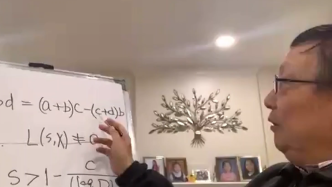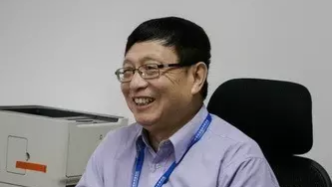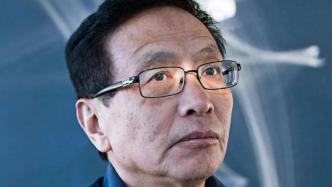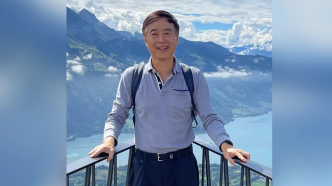
This summer, Purdue University awarded Shen Jie the title of "Distinguished Professor" to express its high recognition of his 21-year teaching career in the Purdue Mathematics Department. "Distinguished Professor" is the highest-level professor title in the school. Obtaining this title will not only increase your prestige and salary, but also provide you with more generous choices in terms of research resources and academic freedom.
However, this title, which brought both fame and fortune, only stayed with Shen Jie for less than a month. At the end of August, at the invitation of Chen Shiyi, the president of Ningbo Eastern University of Science and Technology (tentative name), he joined Eastern University of Science and Technology full-time and served as the dean of the School of Mathematical Sciences.
"Many of my colleagues and friends do not understand my decision." Shen Jie said in a recent exclusive interview with China Science News, "But in fact, I have wanted to return to China for more than ten years."
Returning to the motherland at the age of retirement, Shen Jie is not worried at all that anyone will say that he has "come back to provide for his retirement." On the contrary, he was worried about whether he could work as long as he wanted in China.
Unlike Zhang Yitang, a classmate in the Department of Mathematics at Peking University, Shen Jie’s research direction is applied mathematics. Choosing to join Eastern Institute of Technology, a new research-oriented university, he wanted to continue to “start a new business” in the direction of applied mathematics and interdisciplinary subjects. As for how long he can continue to work, he told reporters that he doesn't feel old yet, "we'll see."
The following is an exclusive interview with Shen Jie by China Science News.
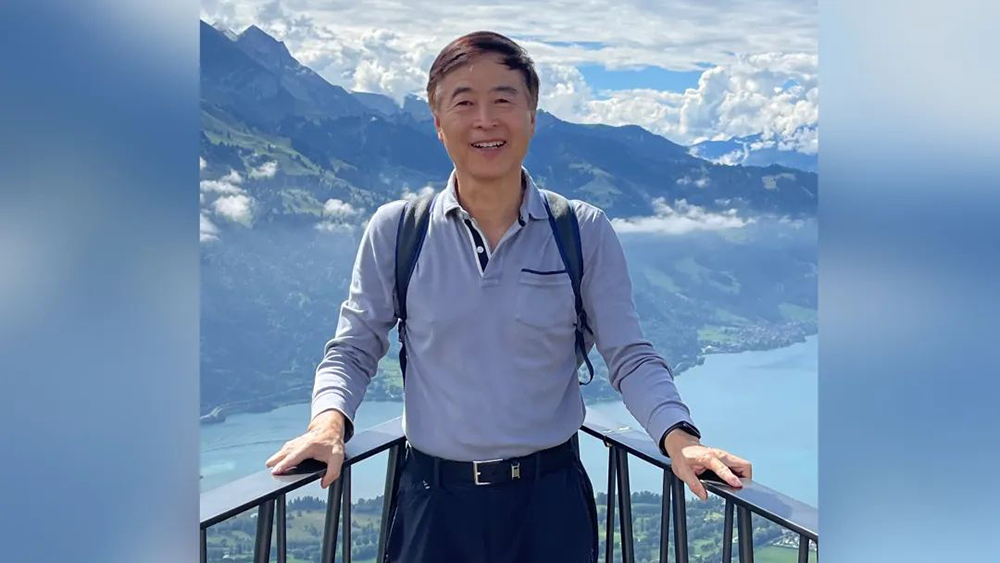
Shen Jie. Photo provided by interviewee
I have already had the idea of returning to my country, and put it into action “with my wife’s approval”
"China Science News": Not long after Purdue University awarded you the title of "Outstanding Professor", you returned to China. Don't you think it's a pity? After all, this is a very high recognition, and it is what you deserve after all your years at Purdue.
Shen Jie: So many of my friends don’t understand it, especially my colleagues at Purdue University. Because "Distinguished Professor" is the highest-level professor at Purdue University, it is not only a nice title, but also means more resources and support, and a higher degree of academic freedom.
China Science News: So under what circumstances did you decide to return to China?
Shen Jie: Actually, I have had the idea of returning to China for a long time. President Chen Shiyi mobilized me when he was the president of Southern University of Science and Technology, but my youngest daughter was still in middle school at that time. Now that she is in college, I made up my mind after getting my wife's approval.
"China Science News": You have given up so much. Did Principal Chen say that you want to compensate for this?
Shen Jie: (laughing) Not really. I thought that since I agreed to Principal Chen, there was nothing more to say.
Choosing to join Eastern University of Technology: “I feel like this is more suitable for me”
China Science News: You are not from Ningbo or Zhejiang. Why did you choose to join Ningbo Oriental University of Science and Technology (tentative name)?
Shen Jie: This is another reason for me to return to China. I think working at Eastern Institute of Technology is worth looking forward to.
"China Science News": Eastern University of Science and Technology may be different from traditional universities. This is a new type of research university with very new educational concepts and management methods.
Shen Jie: Yes, this was the biggest factor that prompted me to make my final decision. Before returning to China, I was a little worried that I might not be particularly adaptable to the domestic environment, but the micro-environment of Eastern Institute of Technology may be more suitable for me. There are a group of scholars here who have experienced similar experiences to me.
"China Science News": Do you mean that the scholars here have similar experiences or backgrounds to you, as well as similar work styles, academic concepts, attitudes and tastes in doing research?
Shen Jie: That’s pretty much it. Objectively speaking, there is indeed a big difference between the scientific research environment at home and abroad. New universities such as Eastern Institute of Technology are in line with international standards in style. Maybe the academic atmosphere is more suitable for people like me who have stayed overseas for a long time. Moreover, human relations and the like here are simpler, and there are no complicated relationships to deal with.
In addition, there are great opportunities here. I have the opportunity to create a mathematics academy from scratch. Of course, there are also many challenges.
"China Science News": You have been at Eastern University of Technology for a few months. Is there anything that makes you feel that this school is more suitable for you in terms of management or style?
Shen Jie: There are many. Things here are more focused on efficiency. For example, applying for a business trip abroad usually involves a lot of tedious procedures, but the procedures here are simpler. Not slightly simple, but very simple.
Not afraid of the rhetoric of "returning to China for retirement", "we'll see how long it lasts"
"China Science News": You have reached the age of retirement. When you return to China at this age, aren't you worried that someone will say that you "return to China to retire"?
Shen Jie: I'm not worried. I have been a tenured professor in the United States for a long time, and I did not come back after I lost my job in the United States. On the contrary, I am worried about whether there will be a retirement age limit in China.
China Science News: Have you ever thought about this issue?
Shen Jie: I have considered this matter. In the United States, the work of the first few decades is actually laying the foundation for the future. After becoming a tenured professor, you can be more relaxed and have more choices. For example, you can retire when you want. I'm not sure if that's the case in the country.
"China Science News": Oriental University of Science and Technology should not be willing to let you retire soon.
Shen Jie: (laughing) I don’t think so. In general, employees may retire at the age of 60, but here you can be more flexible.
China Science News: Have you ever thought about how long you will work at Eastern Institute of Technology?
Shen Jie: I don’t know either, at least I don’t feel old now. Anyway, we'll see. With my current body, I can definitely work for more than 5 years.
"China Science News": You have worked at Purdue University for 22 years, and now you have come to Ningbo Eastern University of Science and Technology to establish the School of Mathematics. Do you feel like "re-starting a business"?
Shen Jie: A little bit. But we are good at doing mathematics, and we don’t need to build laboratories. We just need to recruit outstanding talents, all kinds of permanent and quasi-professors, postdocs, and students, and structure the scientific research and teaching system.
Appointed as the dean of the School of Mathematics and recruited "focusing on internationalization"
China Science News: I noticed that you have been officially appointed as the dean of the School of Mathematical Sciences of Eastern University of Technology. What plans or ideas do you have for establishing the School of Mathematics at Eastern University of Technology?
Shen Jie: Because we are a "technical university", in our planning, we want to focus on carrying out some cross-research in addition to maintaining the important direction of traditional mathematics disciplines. This will also make good use of Eastern Institute of Technology's expertise in engineering and information disciplines. advantages.
Nowadays, engineering and information disciplines also have a strong desire to cooperate with mathematicians. Therefore, our first step is to strengthen the applied mathematics team, and then try to find some breakthroughs in cross-collaboration. Of course, basic mathematics research is also very important. Ultimately, a good mathematics school should take into account both basic and applied research.
"China Science News": Growing the team requires people, especially outstanding mathematical talents. How are you going to attract them?
Shen Jie: The salary and start-up funding here are in line with those of world-class schools, and the working environment is also first-class, both natural and humanistic. (Laughs) It’s a bit like advertising.
The problem is that good talents are in short supply and wanted everywhere, so recruiting them is a big challenge.
"China Science News": Generally speaking, are there more outstanding mathematical talents in foreign countries?
Shen Jie: Indeed. Nowadays, China is attracting more and more outstanding mathematical talents, but generally speaking, the number abroad is still higher.
"China Science News": So when you recruit people, you still have a global orientation, right?
Shen Jie: Yes, we select people regardless of their nationality. The main focus is internationalization, and most of the future teaching courses will be taught in English, so we welcome outstanding talents with education and work experience abroad.
There is a difference between basic mathematics and applied mathematics, but "no one is more advanced than the other"
China Science News: You do computational mathematics. Can you talk about computational mathematics and how ordinary people should understand it?
Shen Jie: The scope of computational mathematics is actually quite large. Simply put, most engineering and scientific problems may ultimately come down to solving a system of equations or optimizing an objective function. We need to construct algorithms so that computers can provide answers.
Nowadays, many expert professors in engineering and science no longer perform experiments, but instead perform computational simulations. This is similar to us, right? It's just that we focus more on how to construct an algorithm to solve a large number of problems, and they focus more on using computers to solve a specific problem. It can also be seen from this that we have a lot of room for "cross-cooperation".
"China Science News": Here I have to mention your old classmate at Peking University, Professor Zhang Yitang who was once buried but is now famous all over the world. He is also a mathematician, but what he does is "pure mathematics" without so many "applications". It can be understood that isn't what you and he are doing a kind of mathematics?
Shen Jie: Completely different, two completely different studies.
"China Science News": What he does is the kind of mathematics that is "completely intoxicating". Many people may not understand what he is doing, but he always enjoys it.
Shen Jie: Yes, Zhang Yitang is doing some highly challenging classic mathematical conjecture problems. These problems do not require application scenarios at all, or may not have any practical applications. This is also the biggest difference between basic mathematics and applied mathematics.
Of course, this does not mean that basic mathematics research is "useless". This must be clearly distinguished. For example, when Zhang Yitang is working on the twin prime number conjecture problem, he may develop some tools that may have some unexpected applications in the future. This is not surprising. For example, current artificial intelligence uses many things that were “pure mathematics” in the past. It can only be said that basic research in mathematics is not aimed at application.
On the other hand, when we do applied mathematics research, we must aim at application scenarios. If the research I do doesn’t solve any problem, then I don’t have to do it.
"China Science News": If we talk about scientific contributions, application and foundation, which type of mathematician has made greater contributions?
Shen Jie: I think both are very important. Pure mathematics and applied mathematics are both very important subjects. There is no saying that one is more important or more advanced than the other.
"China Science News": But in society, people seem to admire mathematicians who have solved or are solving world-wide problems more. Do you think it's unfair?
Shen Jie: This matter can be understood this way. Pure mathematics has many famous problems that have not been solved for hundreds of years, such as Riemann's Hypothesis and Goldbach's Hypothesis. Breakthroughs in these problems, like Zhang Yitang's, will cause global concern. sensation. Applied mathematics is a subject that keeps pace with the times, and the problems it needs to solve are constantly changing. Generally, there is no such sensational effect. But we must also realize that those who do pure mathematics may have difficulty making breakthroughs throughout their lives, but those who do applied mathematics do not have this trouble, and you can make progress every day.
"China Science News": Before Professor Zhang Yitang made a major breakthrough, he had been unknown or even displaced, giving people the feeling of a "late bloomer". However, this is actually in line with the laws of mathematical research, right?
Shen Jie: Yes. Of course, this does not mean that pure mathematical research is "either 1 or 0". In fact, every step forward is also an achievement and contribution.
He once helped Zhang Yitang when he was in decline: "I always believed that he would succeed."
"China Science News": As a classmate and friend of Zhang Yitang, I understand that you have actually tried your best to help him.
Shen Jie: We have a very good relationship as classmates. Moreover, I have always believed that he can become an outstanding mathematician. So, of course, when he needs it, he helps as much as possible.
But there's really not much I can do. While he was studying for his PhD at Purdue University, I was working as a postdoc and visiting scholar at Indiana University, both in Indiana. I would invite him to my home and go to Purdue University to drink and chat with him, so I had a better understanding of his situation at the time.
Later, when I came to work at Pennsylvania State University in the United States, I learned that he was having trouble finding a job, so I helped him contact relevant experts and asked him to come to Penn State University to talk about his research with colleagues in the field here. But at that time, his research results had not yet been published. Although experts admired his work, there was nothing they could do. In the early 1990s, affected by the disintegration of the Soviet Union, a large number of mathematicians from the Soviet Union and Eastern Europe came to the United States to seek employment, making it very difficult to find a teaching position at that time. Although everyone helped him create some conditions, he was indeed unlucky.
"China Science News": Even though he is not very lucky, as you just said, you knew his talent from the beginning and believed that he would succeed, right?
Shen Jie: Yes. When he was at Peking University, he was outstanding in our class and grade.
China Science News: How can this be seen? Test scores?
Shen Jie: Not only his grades, but also his way of thinking about problems and his talents and abilities are a level higher than other students.
"China Science News": So what happened to him later, did you feel a little surprised?
Shen Jie: I feel that fate is very unfair to him, but I have always had hope for him. So when I heard the news that he finally succeeded, I wasn't surprised, I was just very happy for him.
"China Science News": Does a mathematical genius like him need such an experience to temper him?
Shen Jie: I don’t think so. Mathematics geniuses can also be very successful. There are too many people who are born very smart and have very successful lives. But Zhang Yitang was not. He was very smart, but had a very difficult time after graduating from Ph.D.
"China Science News": What is the reason why he suffered like this? Have you talked to him?
Shen Jie: There are many reasons. Choosing the wrong direction and finding the wrong mentor are all very important reasons.
"China Science News": Compared with him, you are much luckier. Your mentor, Mr. Roger Temam, an academician of the French Academy of Sciences, gives the impression of a humble gentleman. What kind of person is he in your mind?
Shen Jie: A typical mathematician with a quiet personality and not very sociable, but very talented and smart.
China Science News: In what aspects do you think you are most influenced by him?
Shen Jie: His way of working. He is very rigorous in academics and has a good way of guiding students. So far, he has supervised about 130 PhD graduates. He should be the tutor with the most PhD graduates in the field of mathematics.
"China Science News": What is his secret for guiding students?
Shen Jie: When he guides students, he usually doesn’t specify what the students should do, but he will give you a general direction so that the students have sufficient space to play freely, and then provide you with as much help as possible when you need it. He is very knowledgeable and can give some suggestions and references for questions raised by students, providing some clues or inspiration for solving problems.
"China Science News": So when you later taught students, did you also inherit his method?
Shen Jie: It’s a bit similar. In short, students are not given a fixed topic and can graduate after completing it. Rather, we hope to cultivate students with good scientific literacy and taste. Roger Temam is very sincere and kind to people. This is a wisdom that I am learning all the time.
(Original title "He gave up the title of top professor at Purdue University and returned full-time to join this unique university")
